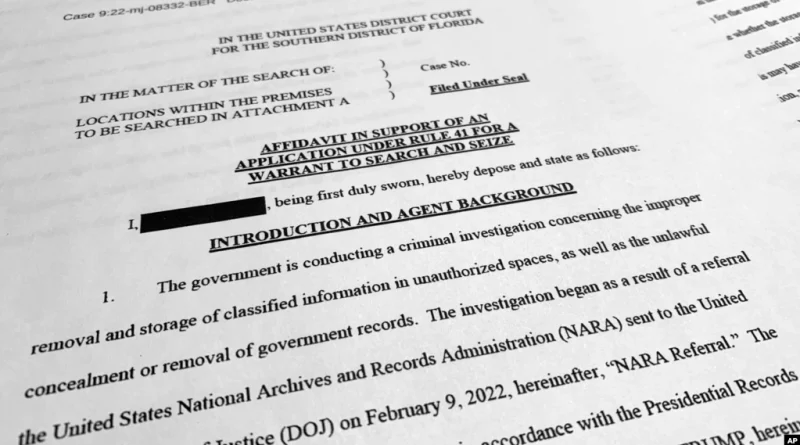DOJ publishes redacted affidavit that prompts search at Mar-a-Lago
DOJ publishes redacted affidavit that prompts search at Mar-a-Lago
The Justice Department released on Friday a redacted version of the affidavit – an affidavit – that the agency used to obtain judicial authorization to search former President Donald Trump’s Florida residence. The publication of the document, with bills, could shed light on the evidence that prompted the unprecedented search.
Significant portions of the 23-page, 38-page document made public Friday were blacked out and 11 pages of text were completely censored.
According to the document released Friday, an unidentified FBI agent said the U.S. National Archives found “classified documents” containing “national defense information” at the Trump residence in January.
The agent said the Justice Department has reason to believe that such records, which have not been returned to the government, are still in the Trump home.
“There is also probable cause to believe that evidence of obstruction [of justice] would be found on the premises,” the agent added.
Judge Bruce Reinhart, who issued the warrant that led to the Aug. 8 search by FBI agents at Trump’s Mar-a-Lago residence, ordered the release of the redacted affidavit by noon Friday.
The search in Palm Beach marked a significant escalation of one of the many federal and state investigations into Trump. The former Republican president has already signaled that he may run again in the next election in 2024.
The FBI’s action came as part of a federal investigation into the legality of Trump taking several boxes of documents from the White House in January 2021.
“The government is conducting a criminal investigation into the improper removal and storage of classified information in unauthorized locations and the unlawful withholding or removal of government documents,” the 38-page affidavit, by a man whose name was withheld by the DOJ before publication, begins with these words.
The FBI seized more than 20 boxes of classified government documents, some of which were marked “top secret.”
The affidavit, a document that is not normally made public unless someone is charged with a crime, is an affidavit outlining the evidence that gave the DOJ probable cause to request a search warrant.
Prosecutors were initially reluctant to release the document, even with bills, to protect the secrecy of the ongoing investigation, prompting several media outlets to file legal action to make the affidavit public.
Judge Reinhart said Thursday that the Justice Department had good reason to keep some documents secret, stressing the need to protect the privacy of witnesses and federal agents, as well as the government investigation and grand jury records.
